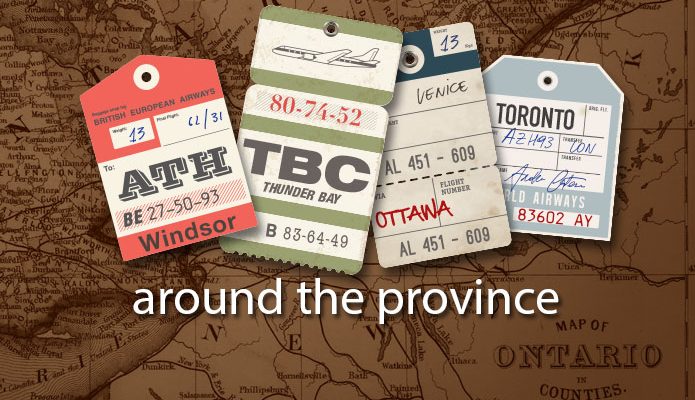
Subject Librarianship vs Functional Teams in Academic Libraries: Questions to Ask!
Many Ontario academic libraries continue to make the shift from subject or discipline-specific librarianship to functional teams. What questions can we ask?
The Shift: From subject/discipline to function teams

Many Ontario academic libraries continue to make the shift from subject or discipline-specific librarianship to functional teams. This is a significant organizational change and poses a challenge for many Ontario academic librarians and libraries. Although libraries at Guelph and Western are perceived to be front-runners with this change, few libraries have remained untouched by this new means of restructuring people, programs and services. Brock and other Ontario academic libraries are currently implementing library reorganization that in part includes this movement towards functional teams.
Librarian administrators and scholars have been quick to share the rationale and benefits of implementing functional teams (Hoodless Pinfield 2018 and further readings below). Yet, there is a disconcerting absence of discussion from disaffected librarians on the potential shortcomings of this move and the perceived loss of independence, identity, and influence. It is hard to capture the full range of emotions colleagues are experiencing with the push towards functional teams. Ashcroft et al (2020) commented that the debate between these two divergent models “…elicits strong emotions, and it is clear that different models fit different organizations, based on the culture, vision, and aspirations of each” (p.53). Academic library leaders need to continue to develop an organizational culture that openly dedicates space and time to work through these divergent, complex, and multi-faceted challenges.
Many frontline librarians behind the scenes anecdotally share uncertainty when pondering the benefits of this top-down strategic priority meant to improve service, eliminate professional silos, and address scalability, capacity, and workload issues. Listening to frontline librarians, being willing to circle back to address cultural issues, and implementing meaningful collaborative change that sticks is the difficult part when finding good answers to difficult questions.
What questions can we ask?

To prompt meaningful change, we should ask the following questions:
- There is a need to assess and evaluate how the functional model is working. What does success look like, how do we know whether this change is, or is not working?
- Effective libraries negotiating change towards functional teams can be more flexible to adapt to change, but how might discipline knowledge be fortified within and between teams?
- Implementing change is dependent upon several contextual factors that demand a complex set of administrative, managerial, and leadership skills. How will the organization ensure that they have these skills? What if they don’t?
- Frontline librarians may feel silod and experience uncertainty, unmet expectations, indifference, resentment, and at times even anger. How can the organization hold space for these feelings?
- How will we ensure that communication within, between, and beyond functional teams is working?
- Are there legacy and cultural issues affected by this structural change?
- Was the movement toward a functional team model able to solve the issues it was ostensibly implemented to address?
Where do we go from here?

Many academic librarians may pivot well to change. Anecdotally, some colleagues have commented that the move to functional teams really “hasn’t changed anything!”
To empower staff, it will be important to help those that continue to experience personal and organizational silos, intermittent communication, top-down decision-making, and a lack of transparency.
Academic librarians engaged in this shift towards implementing functional teams should continue to ask difficult questions, demand responsive leadership, share powerful stories, and be the change we want to see.
Notes
Ian Gordon is a Brock University Library Teaching & Learning librarian. The comments and opinions expressed in this article are not reflective of my employer. Thanks to colleagues serving in Ontario academic libraries that have shared their opinions on this subject and granted permission to include their voices. The corresponding author is igordon@brocku.ca.
References & Annotated Further Readings
- Appleton, L. (2018). Positioning the academic library within the institution: Structures and challenges. New Review of Academic Librarianship, 24(3/4), 209-216. https://doi.org/10.1080/13614533.2019.1582078
A series of 18 position papers that discuss how U.K. academic leader reflect on the roles, values and position of libraries within academic institutions. Roisin Gwyer’s paper on librarians “moving out of their areas” presents a case for the need of innovative solutions, strategic alignments, and essential collaborations to ensure that libraries remain visible and hold a strong position within the academy. Yet, these papers don’t mention the move to functional teams, dealing with disciplinarity, and the consequences of change. - Ashcroft, T., Bird, L., Bull, S., Harper, P., James, A.-M., & Robertson, C. (2020). Engagement with impact: Enhancing the student learning experience during year one of a functional library model. New Review of Academic Librarianship, 26(1), 31-55. https://doi.org/10.1080/13614533.2019.1630450
A follow up study in a U. K. comprehensive university on the benefits and issues involved with a 2017 move to a library functional model. Investigators describe the benefits of this move in creating synergies, improved services, and a broader range of engagement. Regrettably, there is no discussion on the move towards functional models and subsequent pressure points, disappointments and angst experienced by those involved with this change. - Cox, A. M., & Corrall, S. (2013). Evolving academic library specialties. Journal of the American Society for Information Science and Technology, 64(8), 1526-1542. https://doi.org/10.1002/asi.22847
Professional and traditional librarians’ roles are examined through career specialties. Librarian positions are found to evolve due to institutional pressures with strands of optimism and pessimism. - Day, A., & Novak, J. (2019). The subject specialist is dead: Long live the subject specialist! Collection Management, 44(2-4), 117–130. https://doi.org/10.1080/01462679.2019.1573708
This article optimistically and (a bit naïve) discusses how subject specialist continue to be relevant and effective as academic libraries transition to new approaches to collections. - Fox, R. E., & Keisling, B. L. (2016). Build your program by building your team: Inclusively transforming services, staffing and spaces. Journal of Library Administration, 56(5), 526-539. https://doi.org/10.1080/01930826.2015.1105548
A paper written by a Dean and Associate Dean at an American comprehensive university library that leaned on a Kotter-like style of change management strategy. This article reads like a classic library administration perspective on why, how, and what subject to functional change involves – again, this paper is sadly totally absent of critical voices and sticky issues. - Gordon, I. D. (2021, January). The end of libraries and librarianship – Part 34. The Informed Librarian Online @ https://dr.library.brocku.ca/handle/10464/14989
An opinion paper that challenges all librarians to get out there and share stories that libraries and librarians should be more visible than ever before. Let’s change the narrative, stop the collective navel gazing lamenting the plight and end of libraries and librarianship and share our message of hope, change and empowerment! - Hoffmann, K., & Carlisle-Johnston, E. (2021, March 26). “Just like when I was a liaison”: Applying a liaison approach to functional library models. The Journal of Creative Library Practice. https://creativelibrarypractice.org/2021/03/26/just-like-when-i-was-a-liaison-applying-a-liaison-approach-to-functional-library-models/
An interesting article authored by two Western University librarians that reflects on the similarities experienced between subject and functional models. - Hoodless, C., & Pinfield, S. (2018). Subject vs. functional: Should subject librarians be replaced by functional specialists in academic libraries? Journal of Librarianship and Information Science, 50(4), 345-360. https://doi.org/10.1177/0961000616653647
The definitive paper (to date) on the merits of subject and functional teams asks the research question “Why senior managers have chosen certain organisational structures for their university libraries?” A must-read paper (if your going to read only one) that comments on how both models have no real consensus on how change is monitored or accessed. It would be interesting to interview co-authors on how these library structural changes have affected communication, visibility, disciplinarity, and service. - Johnson, A. M. (2020). Reference and liaison librarians: Endangered species or vital partners? Views of academic library administrators. Journal of Library Administration, 60(7), 784-799. https://doi.org/10.1080/01930826.2020.1786979
A review of the state of liaison librarians, their roles, what they think, and how they feel about future prospects. - Luca, E. J. (2019). Reflections on an embedded librarianship approach: The challenge of developing disciplinary expertise in a new subject area. Journal of the Australian Library and Information Association, 68(1), 78–85. https://doi.org/10.1080/24750158.2019.1573631
An academic librarian’s perspective on the challenges of the scale and sustainability of librarians providing specialised embedded support. - Palumbo, L., Bussmann, J., & Kern, B. (2021). The value of subject specialization and the future of science liaison librarianship. College & Research Libraries, 82(4), 584. https://doi.org/10.5860/crl.82.4.584
The authors surveyed over 200 US academic science librarians to find that librarians perceive subject specialization positively, that liaison relationships will remain crucial in the future, and that the push to blended functional team models continues to shape their roles. An interesting article that includes the voices of practicing librarians. - Raju, R., Claassen, J., Adam, A., DAngelo, A., Keraan, S., Mostert, N., & Vonk, S. (2018). Restructuring for relevance: A paradigm shift for academic libraries. Library Management, 39(6-7), 418-429. https://doi.org/10.1108/LM-06-2017-0062
The authors provide a synthesis of issues that continue to transform twenty-first century academic libraries including the move away from subject librarianship. Yet, a superficial paper. - Rodwell, J., & Fairbairn, L. (2008). Dangerous liaisons?: Defining the faculty liaison librarian service model, its effectiveness and sustainability. Library Management, 29(1/2), 116-124. https://doi.org/10.1108/01435120810844694
Two Australian academic librarians’ comment on the forces that continue to shape the faculty liaison librarian structure. An older, but eloquent review of issues academic librarians continues to explore. - Wissinger, C. L., Raish, V., Miller, R. K., & Borrelli, S. (2018). Expert teams in the academic library: Going beyond subject expertise to create scaffolded instruction. Journal of Library Administration, 58(4), 313-333. https://doi.org/10.1080/01930826.2018.1448648
This paper explores how subject librarians (using nursing as an example) can’t be expected to continue to deal with the multiplicity of different roles as subject librarians. The transition to functional expert teams may be the wave of the future when meeting sustainable information-literacy standards, dealing with filling librarian roles without hiring new, or replacing retiring librarians, and filling gaps in service akin to doing more with less.
Ian Gordon is a Brock Library Teaching & Learning Librarian with diverse research, service and instructional interests over a career that has encompassed varied service, management and instruction positions at Brock, Wilfrid Laurier, Guelph and Western University. Ian can be reached at igordon@brocku.ca. ORCiD @ https://orcid.org/0000-0003-1128-3301


